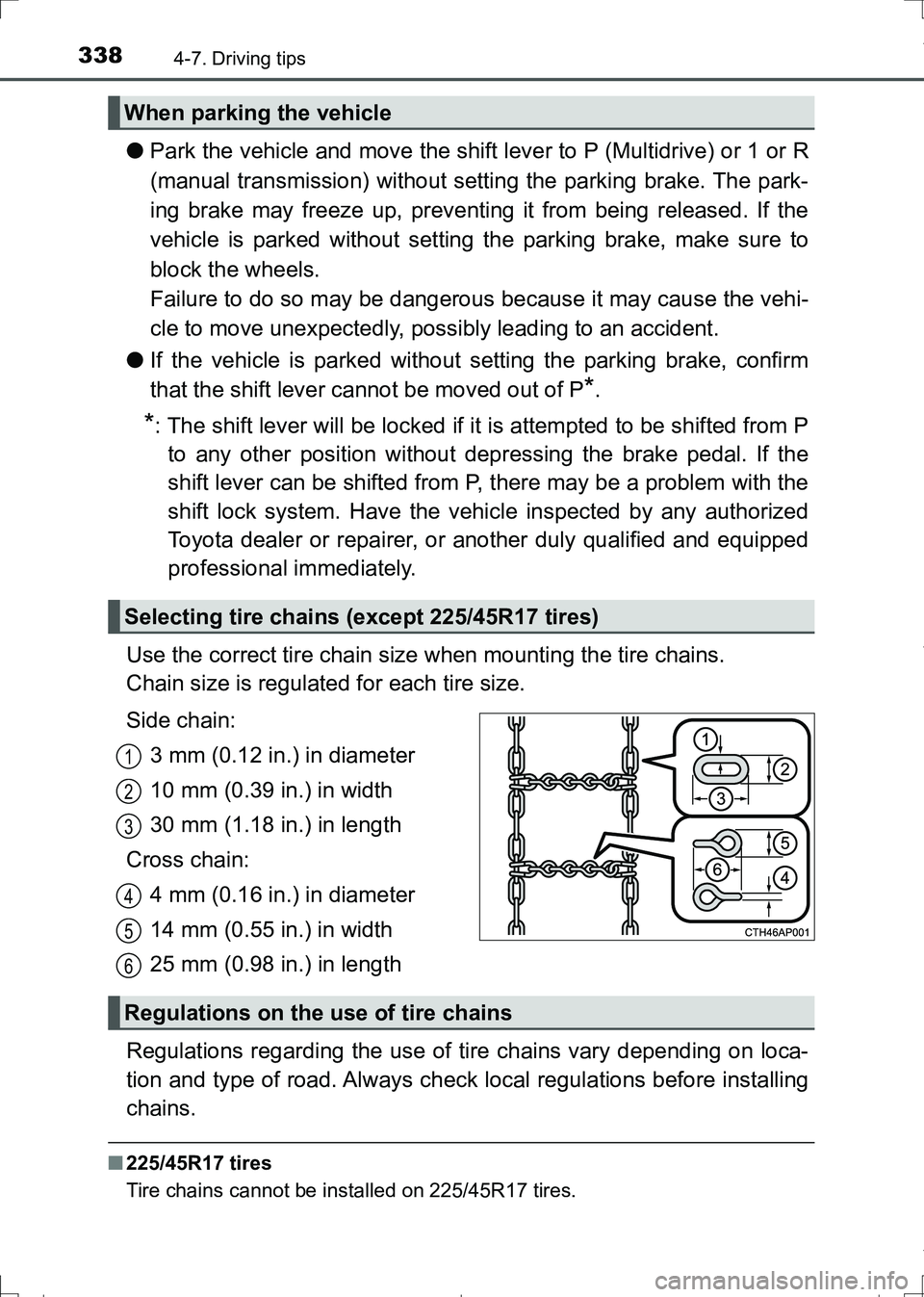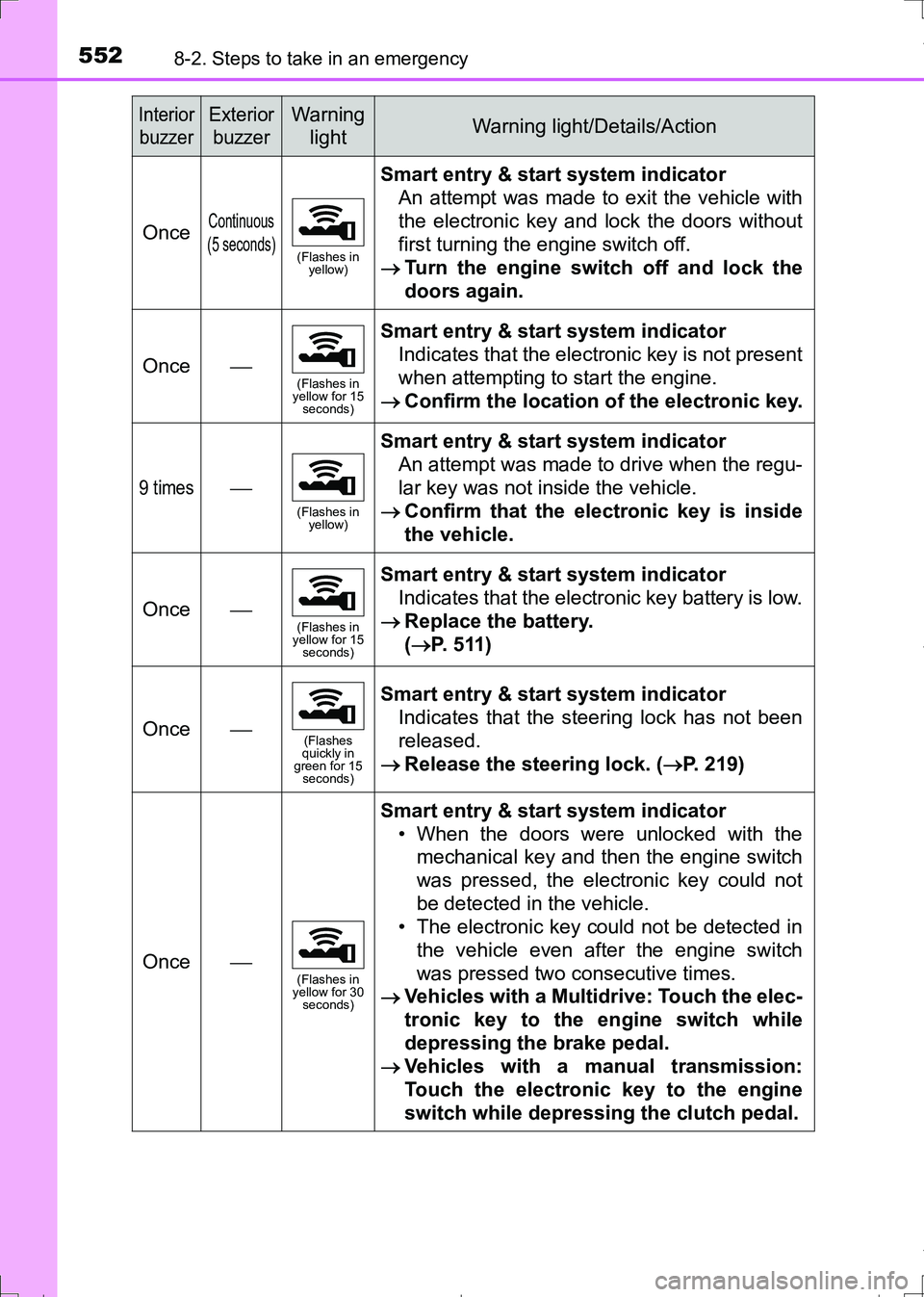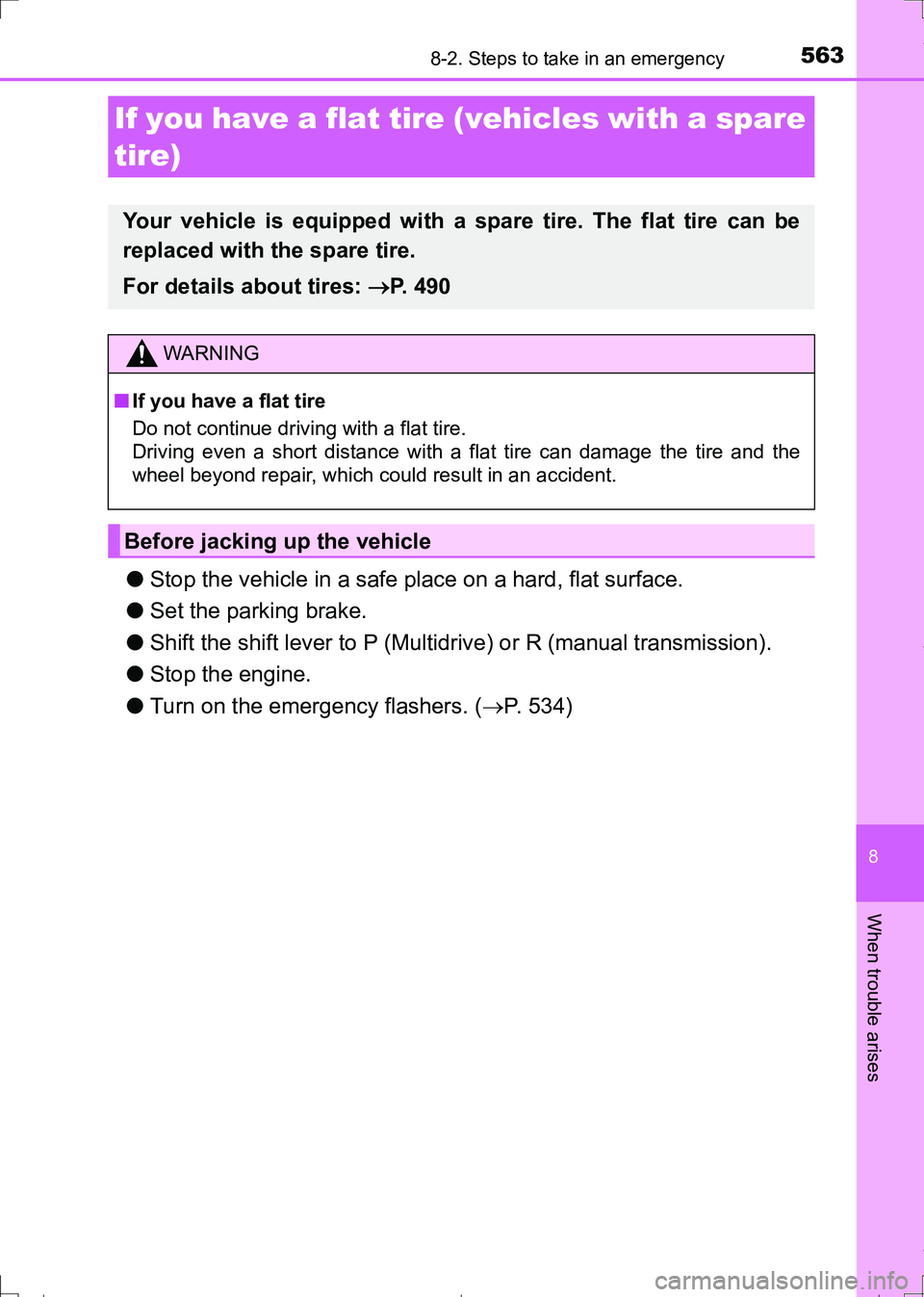2017 TOYOTA AURIS HYBRID manual transmission
[x] Cancel search: manual transmissionPage 313 of 664

3134-6. Using the driving support systems
AURIS Touring Sports_EE (12L13E)
4
Driving
■The Toyota parking assist-sensor can be operated when
Vehicles without a smart entry & start system:
The engine switch is in the “ON” position.
Vehicles with a smart entry & start system:
The engine switch is in IGNITION ON mode.
●Front sensors:
• Vehicles with a Multidrive:
The shift lever is in a position other than P.
• Vehicles with a manual transmission:
The parking brake is not applied.
• The vehicle speed is less than about 10 km/h (6 mph).
(At any speed when the shift lever is in R)
●Rear sensors:
The shift lever is in R.
■Sensor detection information
●Certain vehicle conditions and the surrounding environment may affect the
ability of the sensor to correctly detect obstacles. Particular instances where
this may occur are listed below.
• There is dirt, snow or ice on the sensor.
• A sensor is frozen.
• A sensor is covered in any way.
• The vehicle is leaning considerably to one side.
• On an extremely bumpy road, on an incline, on gravel, or on grass.
• The vicinity of the vehicle is noisy due to vehicle horns, motorcycle
engines, air brakes of large vehicles, or other loud noises producing ultra-
sonic waves.
• There is another vehicle equipped with parking assist sensors in the
vicinity.
• A sensor is coated with a sheet of spray or heavy rain.
• The vehicle is equipped with a fender pole or wireless antenna.
• Towing eyelet is installed.
• A bumper or sensor receives a strong impact.
• The vehicle is approaching a tall or curved curb.
• In harsh sunlight or intense cold weather.
• A non-genuine Toyota suspension (lowered suspension etc.) is installed.
In addition to the examples above, there are instances in which, because of
their shapes, signs and other objects may be judged by the sensor to be
closer than they are.
AURIS Touring Sports_OM_Europe_OM12L13E.book 313 ページ 2016年6月27日 月曜日 午後5時21分
Page 319 of 664

3194-6. Using the driving support systems
AURIS Touring Sports_EE (12L13E)
4
Driving
When the rear Toyota parking
assist-sensor’s warning buzzer
sounds continuously, com-
pletely stop the vehicle immedi-
ately.
The multi-information display will
change when the warning buzzer
starts sounding continuously.
Shift the shift lever to D (Multidrive) or 1 (manual transmission).
While the steering wheel is turning, keep the vehicle at a complete stop.
When the steering wheel stops turning, move the vehicle forward slowly
while checking the safety of the area in front of the vehicle.
When the front Toyota parking
assist-sensor’s warning buzzer
sounds continuously, com-
pletely stop the vehicle immedi-
ately.
The multi-information display will
change when the warning buzzer
starts sounding continuously.
7
8
9
AURIS Touring Sports_OM_Europe_OM12L13E.book 319 ページ 2016年6月27日 月曜日 午後5時21分
Page 334 of 664

3344-6. Using the driving support systems
AURIS Touring Sports_EE (12L13E)■EPS operation sound
When the steering wheel is operated, a motor sound (whirring sound) may be
heard. This does not indicate a malfunction.
■Automatic reactivation of TRC and VSC systems
After turning the TRC and VSC systems off, the systems will be automatically
re-enabled in the following situations:
●Vehicles without a smart entry & start system: When the engine switch is
turned to the “LOCK” position
Vehicles with a smart entry & start system: When the engine switch is turned
off
●If only the TRC system is turned off, the TRC will turn on when vehicle
speed increases
If both the TRC and VSC systems are turned off, automatic re-enabling will
not occur when vehicle speed increases.
■Reduced effectiveness of the EPS system
The effectiveness of the EPS system is reduced to prevent the system from
overheating when there is frequent steering input over an extended period of
time. The steering wheel may feel heavy as a result. Should this occur, refrain
from excessive steering input or stop the vehicle and turn the engine off. The
EPS system should return to normal within 10 minutes.
■Operating conditions of hill-start assist control
When the following four conditions are met, the hill-start assist control will
operate:
●Vehicles with a Multidrive: The shift lever is in a position other than P or N
(when starting off forward/backward on an upward incline).
●Vehicles with a manual transmission: The shift lever is in a position other
than R when starting off forward on an upward incline or in R when starting
off backward on an upward incline.
●The vehicle is stopped.
●The accelerator pedal is not depressed.
●The parking brake is not engaged.
■Automatic system cancelation of hill-start assist control
The hill-start assist control will be canceled in any of the following situations:
●Vehicles with a Multidrive: The shift lever is shifted to P or N.
●Vehicles with a manual transmission: The shift lever is shifted to R when
starting off forward on an upward incline or from R when starting off back-
ward on an upward incline.
●The accelerator pedal is depressed.
●The parking brake is engaged.
●Approximately 2 seconds elapse after the brake pedal is released.
AURIS Touring Sports_OM_Europe_OM12L13E.book 334 ページ 2016年6月27日 月曜日 午後5時21分
Page 338 of 664

3384-7. Driving tips
AURIS Touring Sports_EE (12L13E)
●Park the vehicle and move the shift lever to P (Multidrive) or 1 or R
(manual transmission) without setting the parking brake. The park-
ing brake may freeze up, preventing it from being released. If the
vehicle is parked without setting the parking brake, make sure to
block the wheels.
Failure to do so may be dangerous because it may cause the vehi-
cle to move unexpectedly, possibly leading to an accident.
●If the vehicle is parked without setting the parking brake, confirm
that the shift lever cannot be moved out of P
*.
*: The shift lever will be locked if it is attempted to be shifted from P
to any other position without depressing the brake pedal. If the
shift lever can be shifted from P, there may be a problem with the
shift lock system. Have the vehicle inspected by any authorized
Toyota dealer or repairer, or another duly qualified and equipped
professional immediately.
Use the correct tire chain size when mounting the tire chains.
Chain size is regulated for each tire size.
Side chain:
3 mm (0.12 in.) in diameter
10 mm (0.39 in.) in width
30 mm (1.18 in.) in length
Cross chain:
4 mm (0.16 in.) in diameter
14 mm (0.55 in.) in width
25 mm (0.98 in.) in length
Regulations regarding the use of tire chains vary depending on loca-
tion and type of road. Always check local regulations before installing
chains.
■225/45R17 tires
Tire chains cannot be installed on 225/45R17 tires.
When parking the vehicle
Selecting tire chains (except 225/45R17 tires)
1
2
3
4
5
Regulations on the use of tire chains
6
AURIS Touring Sports_OM_Europe_OM12L13E.book 338 ページ 2016年6月27日 月曜日 午後5時21分
Page 460 of 664

4607-2. Maintenance
AURIS Touring Sports_EE (12L13E)
■Where to go for maintenance service?
In order to maintain your vehicle in the best possible condition, Toyota recom-
mends that maintenance service operations as well as other inspections and
repairs be carried out by authorized Toyota dealers or repairers or other duly
qualified and equipped professionals. For repairs and services covered by
your warranty, please visit an authorized Toyota dealer or repairer, who will
use genuine Toyota parts in repairing any difficulties you may encounter.
There can also be advantages in utilizing authorized Toyota dealers or repair-
ers for non-warranty repairs and services, as members of the Toyota network
will be able to expertly assist you with any difficulties you may encounter.
Your Toyota dealer or repairer, or another duly qualified and equipped profes-
sional will perform all of the scheduled maintenance on your vehicle reliably
and economically due to their experience with Toyota vehicles.
■Does your vehicle need repair?
Be on the alert for changes in performance and sounds, and visual tip-offs
that indicate service is needed. Some important clues are:
●Engine missing, stumbling, or pinging
●Appreciable loss of power
●Strange engine noises
●A fluid leak under the vehicle (However, water dripping from the air condi-
tioning after use is normal.)
●Change in exhaust sound (This may indicate a dangerous carbon monoxide
leak. Drive with the windows open and have the exhaust system checked
immediately.)
●Flat-looking tires, excessive tire squeal when cornering, uneven tire wear
●Vehicle pulls to one side when driving straight on a level road
●Strange noises related to suspension movement
●Loss of brake effectiveness, spongy feeling brake pedal or clutch pedal
(vehicles with a manual transmission), pedal almost touches the floor, vehi-
cle pulls to one side when braking
●Engine coolant temperature continually higher than normal
If you notice any of these clues, take your vehicle to any authorized Toyota
dealer or repairer, or another duly qualified and equipped professional, as
soon as possible. Your vehicle may need adjustment or repair.
AURIS Touring Sports_OM_Europe_OM12L13E.book 460 ページ 2016年6月27日 月曜日 午後5時21分
Page 552 of 664

5528-2. Steps to take in an emergency
AURIS Touring Sports_EE (12L13E)
OnceContinuous
(5 seconds)
(Flashes in
yellow)
Smart entry & start system indicator
An attempt was made to exit the vehicle with
the electronic key and lock the doors without
first turning the engine switch off.
Turn the engine switch off and lock the
doors again.
Once
(Flashes in
yellow for 15
seconds)
Smart entry & start system indicator
Indicates that the electronic key is not present
when attempting to start the engine.
Confirm the location of the electronic key.
9 times
(Flashes in
yellow)
Smart entry & start system indicator
An attempt was made to drive when the regu-
lar key was not inside the vehicle.
Confirm that the electronic key is inside
the vehicle.
Once(Flashes in
yellow for 15
seconds)
Smart entry & start system indicator
Indicates that the electronic key battery is low.
Replace the battery.
(P. 511)
Once(Flashes
quickly in
green for 15
seconds)
Smart entry & start system indicator
Indicates that the steering lock has not been
released.
Release the steering lock. (P. 219)
Once(Flashes in
yellow for 30
seconds)
Smart entry & start system indicator
• When the doors were unlocked with the
mechanical key and then the engine switch
was pressed, the electronic key could not
be detected in the vehicle.
• The electronic key could not be detected in
the vehicle even after the engine switch
was pressed two consecutive times.
Vehicles with a Multidrive: Touch the elec-
tronic key to the engine switch while
depressing the brake pedal.
Vehicles with a manual transmission:
Touch the electronic key to the engine
switch while depressing the clutch pedal.
Interior
buzzerExterior
buzzerWarning
lightWarning light/Details/Action
AURIS Touring Sports_OM_Europe_OM12L13E.book 552 ページ 2016年6月27日 月曜日 午後5時21分
Page 563 of 664

5638-2. Steps to take in an emergency
AURIS Touring Sports_EE (12L13E)
8
When trouble arises
●Stop the vehicle in a safe place on a hard, flat surface.
●Set the parking brake.
●Shift the shift lever to P (Multidrive) or R (manual transmission).
●Stop the engine.
●Turn on the emergency flashers. (P. 534)
If you have a flat tire (vehicles with a spare
tire)
Your vehicle is equipped with a spare tire. The flat tire can be
replaced with the spare tire.
For details about tires: P. 490
WARNING
■If you have a flat tire
Do not continue driving with a flat tire.
Driving even a short distance with a flat tire can damage the tire and the
wheel beyond repair, which could result in an accident.
Before jacking up the vehicle
AURIS Touring Sports_OM_Europe_OM12L13E.book 563 ページ 2016年6月27日 月曜日 午後5時21分
Page 577 of 664

5778-2. Steps to take in an emergency
AURIS Touring Sports_EE (12L13E)
8
When trouble arises
■Before repairing the tire
●Stop the vehicle in a safe place on a hard, flat surface.
●Set the parking brake.
●Shift the shift lever to P (Multidrive) or N (manual transmission).
●Stop the engine.
●Turn on the emergency flashers. (P. 534)
●Check the degree of the tire
damage.
Do not remove the nail or
screw from the tire. Remov-
ing the object may widen the
opening and prevent emer-
gency repair with the repair
kit.
■A flat tire that cannot be repaired with the emergency tire puncture repair
kit
In the following cases, the tire cannot be repaired with the emergency tire
puncture repair kit. Contact any authorized Toyota dealer or repairer, or
another duly qualified and equipped professional.
●When the tire is damaged due to driving without sufficient air pressure
●When there are any cracks or damage at any location on the tire, such as on
the side wall, except the tread
●When the tire is visibly separated from the wheel
●When the cut or damage to the tread is 4 mm (0.16 in.) long or more
●When the wheel is damaged
●When two or more tires have been punctured
●When 2 or more sharp objects such as nails or screws have passed through
the tread on a single tire
●When the sealant has expired
AURIS Touring Sports_OM_Europe_OM12L13E.book 577 ページ 2016年6月27日 月曜日 午後5時21分